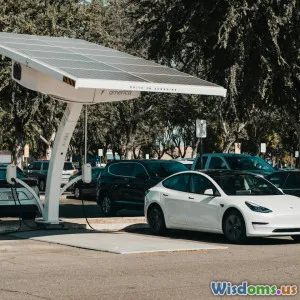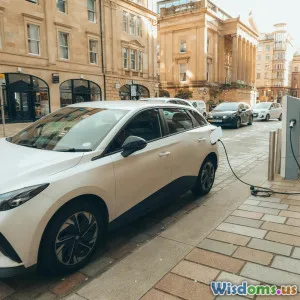
Electric Cars: A Sustainable Future
7 min read Explore how electric cars drive a sustainable future with cutting-edge tech and environmental benefits. (0 Reviews)
Electric Cars: A Sustainable Future
In an era marked by environmental urgency and rapid technological advances, electric cars have emerged as a linchpin in the transition towards sustainable transportation. The prospect of moving away from fossil-fueled vehicles towards electric alternatives isn't just a trend—it's a global movement aimed at reducing carbon emissions, improving air quality, and redefining the future of mobility. This article dives into the compelling reasons why electric vehicles (EVs) are crucial for a sustainable future, the technology behind their rise, and what this means for society at large.
The Environmental Imperative
Transportation accounts for roughly 24% of global CO2 emissions, according to the International Energy Agency (IEA). Traditional internal combustion engines rely on gasoline or diesel, which emit large amounts of greenhouse gases and harmful pollutants like nitrogen oxides and particulate matter. Electric vehicles, by contrast, operate on battery-powered electric motors producing zero tailpipe emissions.
But the sustainability of EVs extends beyond just replacing fuel. When powered by renewable energy, such as solar or wind, their overall carbon footprint is dramatically reduced. For instance, a 2021 study published in Nature Sustainability reports that electric cars running on grid electricity produced from renewables emit 70-80% fewer emissions over their life cycle compared to gasoline cars. Tesla, a pioneering brand in EVs, demonstrated this in markets like California, where increasing solar capacity translates directly into greener EV charging.
Advancements in Battery Technology
One of the key barriers to the widespread adoption of electric cars has traditionally been battery performance—primarily concerns about range, charging time, and cost. Recent leaps in lithium-ion battery technology have substantially addressed these issues.
Consider the progress made by companies like Panasonic, LG Chem, and Samsung SDI, which have developed batteries with higher energy density, enabling ranges that exceed 350 miles per charge on some models, such as the Tesla Model S Plaid and Mercedes EQS. Moreover, innovations in solid-state batteries promise even safer, faster-charging, and longer-lasting solutions in the near future.
The rapid growth of public fast-charging stations has also made EV ownership more convenient. Networks like Electrify America in the US and Ionity in Europe are scaling robust infrastructure that can recharge vehicles in under 30 minutes—a game-changer for daily commuters and long-distance travelers alike.
Economic and Social Benefits
Electric cars are no longer a luxury item—they’re becoming economically accessible and socially beneficial. The total cost of ownership is shrinking as battery prices drop; BloombergNEF forecasts battery pack costs to fall below $100 per kWh by 2024, the threshold at which EVs become cost-competitive with gasoline vehicles without subsidies.
Furthermore, electric cars reduce urban noise pollution due to their quieter motors. Health benefits from cleaner air in cities are substantial. According to the World Health Organization (WHO), air pollution is linked to 7 million premature deaths annually, illuminating the critical role EVs play in public health.
Governments worldwide incentivize EV adoption through tax credits, rebates, and green zones—areas where internal combustion engine vehicles face restrictions or higher fees. China, a global EV market leader, implemented robust governmental policies, resulting in electric vehicles accounting for over 25% of new car sales by 2023.
Challenges and Solutions
While EVs offer immense promise, they also face challenges that need addressing to ensure a truly sustainable future. Mining raw materials such as lithium, cobalt, and nickel has ecological and ethical concerns. Responsible sourcing, recycling programs, and alternative materials research are critical.
For example, companies like Redwood Materials are pioneering battery recycling technologies to reduce dependency on raw mineral extraction. Research into batteries using abundant materials like sodium or enhancing power-to-weight efficiency also holds promise.
Grid demand is another concern. Increased EV adoption elevates electricity consumption, but with smart grids and vehicle-to-grid (V2G) technologies, electric cars could actually stabilize electricity systems by feeding energy back during peak demand.
The Road Ahead
The future of electric cars hinges on integrated approaches combining technology, policy, and consumer behavior. Autonomous EVs, ride-sharing models, and sustainable urban planning could reshape how we perceive vehicle ownership and urban mobility.
Automakers are committing billions to EV development. General Motors recently announced plans to exclusively offer electric light-duty vehicles by 2035, while Volvo aims to be a fully electric car company by the same year.
The rapid decline in battery costs, expansion of renewable energy, and growing environmental awareness signal electric cars are set to redefine transportation. As consumers and policymakers align towards sustainability goals, electric vehicles are not only a technical innovation—they’re a critical driver towards a cleaner, healthier planet.
Conclusion
Electric cars present an indispensable tool for achieving a sustainable future. Through cutting-edge battery technology, environmental benefits, and evolving infrastructure, EVs offer an electric revolution in mobility. While challenges remain, they are being met with innovation and responsibility, ensuring that future generations inherit a cleaner atmosphere and a stronger economy. The road ahead is electric—and it’s charged with promise.
By understanding the transformative potential and impacts of electric vehicles, each reader can contribute to sustainability, whether by adopting EVs or supporting policies that accelerate clean transportation.
Rate the Post
User Reviews
Popular Posts


















